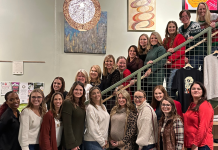
When holiday parties roll around, friends and family gather around tables, cluster in the kitchen, head to restaurants, play festive music, and engage in general holiday merriment. These scenarios often alienate those who experience communication struggles. Noisy, hectic situations can make it difficult to hear and be understood when a speech, language or hearing challenge is present.
Here are a few suggestions for family members who strive to make the holidays more inclusive for those who are hard of hearing and/or have verbal differences:
Consider adults and children with hearing challenges.
- Face the person with hearing difficulties.
- Be close enough so he/she can see your lips easily.
- Keep your hands, food and cups away from your mouth when talking.
- Consider moving to a part of the room that is quiet.
- Encourage one person to talk at a time.
- Know that seating might make a difference; providing a seat at the end of the table to reduce background noise and multiple conversations can be helpful.
Consider children and adults with speech and language difficulties.
- Be patient; let him/her know you are willing to listen.
- Avoid finishing his/her sentences or trying to predict what they will say.
- If you have trouble understanding someone, repeat the part that you understood, then ask for clarification on the specific part you missed. It’s less taxing on the speaker.
- When appropriate, ask someone to try and tell you “in a different way” or say “can you show me what you mean?” Using gestures and pointing can be very helpful.
- Don’t make jokes about their struggle. If you think making a joke will help you appear accepting, you are most likely incorrect.
- Avoid giving up or showing frustration. If you think it is difficult to be a listener, know that it is 10 times harder for the person who has trouble expressing themselves on a daily basis.
- Don’t cut the conversation short because listening is hard. Take the time. It will make a huge difference.
- Let kids try to tell you something two or three times before you consult parents to interpret.
- Use phrases such as “I know what you have to say is important and I cannot figure it out. Let’s go see if ____ can help me.” This approach lets people know that you care.
- If someone talks very minimally or not at all, it is still desirable for them to be part of the conversation. Use their name often. Bring them to the table. Make eye contact. Touch their hand or shoulder occasionally. Tell stories that involve them.
- Above all, include people with speech and language difficulties in conversation. Whether someone has articulation difficulties, aphasia, stuttering, autism, or are non-verbal, EVERYONE wants to be part of the group.
Consider parents of children with speech and hearing difficulties.
- Avoid asking questions such as “Is he talking yet?” This can be upsetting for parents.
- Listen when parents provide advice or suggestions regarding their children. They spend every day with their child and know them best.
- Ask about what is going on in their child’s life. Quite often, kids who are developmentally on track have a lot of common daily activities (e.g., sports, homework) that are easy topics of discussion. Children with speech and language struggles (or other special needs) may spend their time differently. If you are not sure how to start the conversation, simply say, “So what’s keeping Johnny busy these days?”

People with speech and hearing challenges simply want the same opportunities and conditions that everyone else experiences (or as close as possible). As friends and family members, we can help create an environment that considers their needs and adapts accordingly.


















